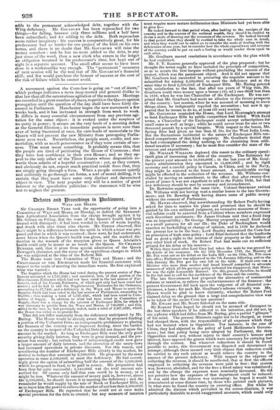A movement against the Corn-law is going on "out of
doors," -which perhaps indicates a more deep-rooted and general dislike to that law than all the ostentatious agitation of the summer. Meetings are recorded in a great number of places, to petition the Queen against prorogation until the question of the day shall have been fairly dis- cussed in Parliament. Manchester began the new movement a few weeks back, and it has increased in strength from week to week. It differs in many essential circumstances from any previous agi- tation for the same object : it is evoked under the auspices of no party in power; it occurs on the very heels of a seeming defeat at the General Election ; its immediate purpose is more sure than ever of being frustrated at once, for cart-loads of memorials to the Queen will not prevent the new Ministry from proroguing Parlia- ment next week. Nevertheless, the people meet, confer, and me- morialize, with as much perseverance as if they were certain of suc- cess. That must mean something. It probably means this, that the people are tired of petitioning the House of Commons ; that they have lost confidence in their own House ; and so they ap- peal to the only other of the Three Estates whose disposition to- wards them admits of a hopeful construction : yet, as they cannot, and obviously do not, expect much practical result from that, they are simply going through a form. When a people consent quietly and uniformly to go through set forms, a sort of moral drilling, it is certain that they must have some very distinct and determined object in view. The next popular step will be a matter of great interest to the speculative politician : the statesman will be wise Dot to neglect the present.


























 Previous page
Previous page